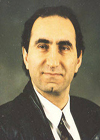Combustion and Emissions for Engineers 97011
Topics: Powertrain & Propulsion
Public awareness regarding pollutants and their adverse health effects has created an urgent need for engineers to better understand the combustion process as well as the pollutants formed as by-products of that process. To effectively contribute to emission control strategies and design and develop emission control systems and components, a good understanding of the physical and mathematical principles of the combustion process is necessary. This course will bring issues related to combustion and emissions "down to earth," relying less on mathematical terms and more on physical explanations and analogies.
Learning Objectives
By attending this course, you will be able to:
- Identify and describe the important processes in combustion and emission
- Identify the formation mechanisms and reduction strategies of pollutant species in combustion systems
- Recognize the effects of engine design and operating conditions on combustion and emission
- Explain the technology and the logic behind after-treatment of pollutants
- Identify the underlying laws and principles used in combustion and emission black-boxed computer programs
- Explain the role chemical kinetics plays in the design of low-emission combustion systems
- Identify design trade-offs between increasing engine performance and maintaining low emission characteristics
Who Should Attend
Engineers working on the design of combustion engine components, software development and application for modeling of thermal-fluid combustion and emissions processes, and those working on the reduction of harmful pollutants emissions will find this course valuable.
Testimonials
"Very interesting course. It reinforces basic concepts each engineer involved in powertrain controls should know."
Luis Gamiño
Calibration Engineer
Ford Motor Co. de México
"Great and thorough content of everything that has to do with combustion and emissions from basic chemistry to applications. This is a must for anyone working with engines."
Andrés A. Toledo
PCCN Calibration Engineer
Ford Motor Co. de México
”This course is the fundamental concrete of combustion science. Dr. Chehroudi is a master, presenting complex ideas in down to earth terms for all to understand."
David Sherman
Powertrain Calibration Engineer
Robert Bosch LLC
”It is an excellent course to improve your knowledge of internal combustion engines. Everything is explained well, with real examples that could help you at work or with developments of new ideas."
Jacqueline Arzate
Calibrator Engineer
Ford Motor Company
"Combustion and Emissions for Engineers is an excellent overview of the internal combustion engine's underlying chemistry."
Steven Cagle
Engineer
Synerject
"Dr. Bruce Chehroudi successfully blends theoretical and practical explanations of combustion and emissions subjects to maximize comprehension. This course is an excellent way to steepen the learning curve in this complex and fascinating area of Engineering. Highly recommended; bring your questions!"
Jeremy (Jay) Palko
Engine Systems & Dyno Development Engineer
Chrysler LLC
You must complete all course contact hours and successfully pass the learning assessment to obtain CEUs.
Bruce Chehroudi
 Dr. Chehroudi is a Professor and Department Head at the Arkansas Tech University. His previous positions include: Chief Scientist and Group Leader at Advanced Technology Consultants, Principal Scientist at Air Force Research Laboratory (AFRL/ERC), Chief Scientist at Raytheon STX (formerly Hughes Aircraft STX), Professor of Mechanical Engineering, and Research Staff Member at Princeton University. He specializes in fluid mechanics and heat transfer, laser optical diagnostics, internal combustion engine, gas turbine and rocket engines, structure of sprays, gas turbine engines, combustion, fuel injection issues and emission of pollutants. Dr. Chehroudi is an AIAA Associate Fellow, a member of Ta Beta Pi and the recipient of several SAE awards including the Arch T. Colwell Merit Award, the Ralph R. Teetor Award, the SAE Recognition Award and the SAE Forest R. McFarland Award in recognition of his efforts and leadership in contributions to the Continuing Professional Development Seminars. He has taught courses in the areas of internal combustion engines, thermodynamics, thermophysics of gas flows, combustion, and measurement system, and has more than 150 publications and over 200 presentations in conferences, national and international journals. Dr. Chehroudi has a Ph.D from Princeton University.
Dr. Chehroudi is a Professor and Department Head at the Arkansas Tech University. His previous positions include: Chief Scientist and Group Leader at Advanced Technology Consultants, Principal Scientist at Air Force Research Laboratory (AFRL/ERC), Chief Scientist at Raytheon STX (formerly Hughes Aircraft STX), Professor of Mechanical Engineering, and Research Staff Member at Princeton University. He specializes in fluid mechanics and heat transfer, laser optical diagnostics, internal combustion engine, gas turbine and rocket engines, structure of sprays, gas turbine engines, combustion, fuel injection issues and emission of pollutants. Dr. Chehroudi is an AIAA Associate Fellow, a member of Ta Beta Pi and the recipient of several SAE awards including the Arch T. Colwell Merit Award, the Ralph R. Teetor Award, the SAE Recognition Award and the SAE Forest R. McFarland Award in recognition of his efforts and leadership in contributions to the Continuing Professional Development Seminars. He has taught courses in the areas of internal combustion engines, thermodynamics, thermophysics of gas flows, combustion, and measurement system, and has more than 150 publications and over 200 presentations in conferences, national and international journals. Dr. Chehroudi has a Ph.D from Princeton University.
